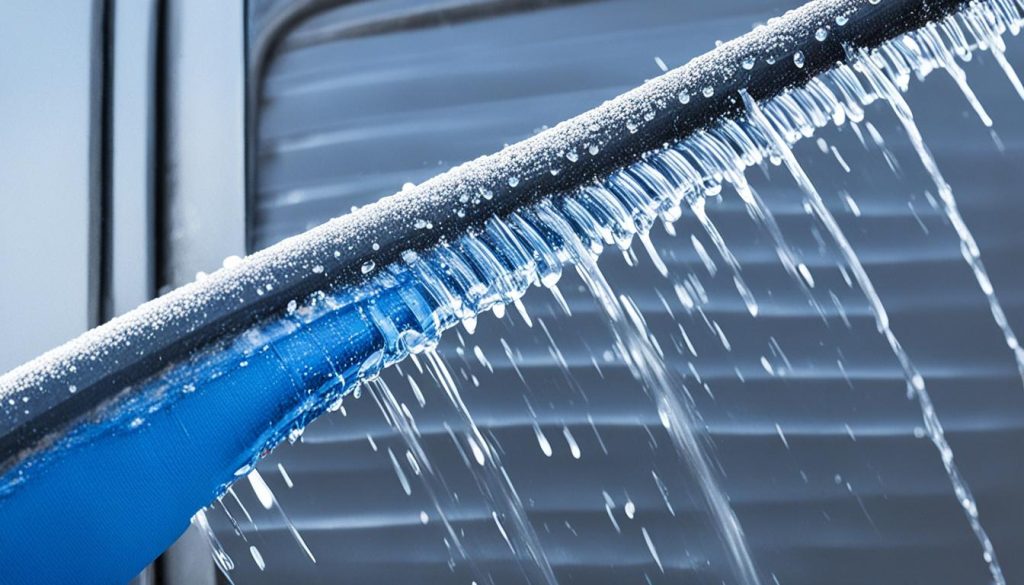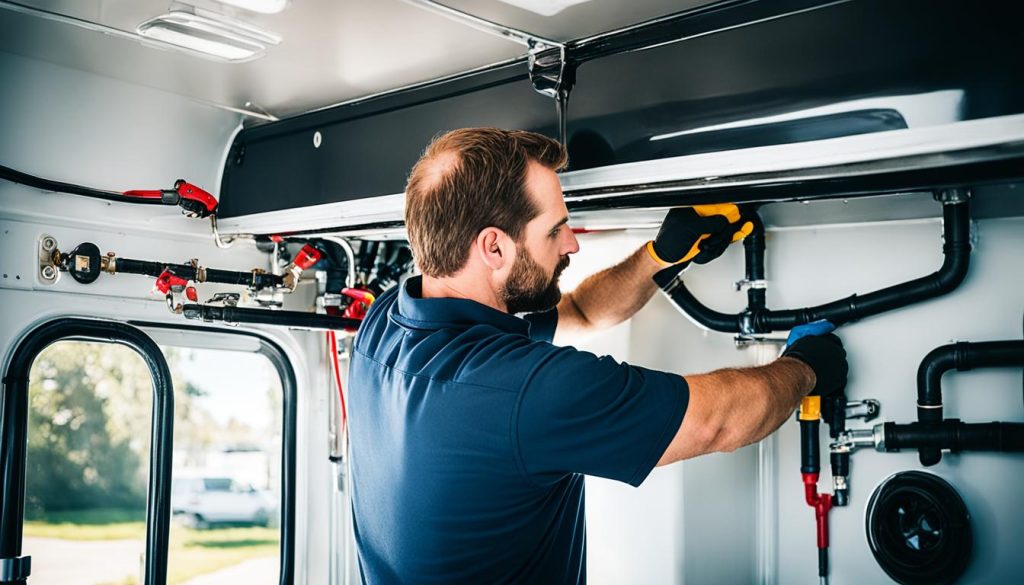Expert Tips for Your Trailer Plumbing Needs
Did you know that proper maintenance of your trailer plumbing system can save you thousands of dollars in repair costs? That’s right, ensuring your mobile home’s plumbing is in good working order can prevent expensive leaks, clogs, and other plumbing issues.
Trailer plumbing is an essential component of your mobile home, ensuring you have access to clean water and functional waste management systems. Understanding how your trailer plumbing works and how to maintain and repair it is crucial for a comfortable and hassle-free experience on the road.
- Regular maintenance of your trailer plumbing system can save you money in the long run.
- Understanding how your trailer plumbing works is crucial for a comfortable experience on the road.
- Proper maintenance includes inspecting your water heater, using water filters, and practicing good waste management.
- Common trailer plumbing issues include leaks, clogs, and malfunctioning pumps.
- Efficient trailer plumbing can be achieved by conserving water and practicing proper waste management.
How Does Trailer Plumbing Work?
Trailer plumbing operates similarly to residential plumbing systems. It consists of various components that work together to provide you with a functional water and waste management system for your camper or RV. Understanding how these systems function is essential for maintaining and troubleshooting any potential issues that may arise.
Water Supply and Distribution
The water supply in your trailer comes from a water pump that delivers water to your fixtures, such as sinks, showers, and toilets. The pump draws water from the fresh water tank and uses pressure to distribute it throughout the plumbing system. This allows you to access water whenever you need it, just like in a traditional home.
Water Heating
To ensure you have hot water for your daily needs, trailer plumbing also includes a water heater. The water heater, powered by propane or electricity, heats up the water as it flows through the system. This allows you to enjoy hot showers, wash dishes, and perform other tasks that require warm water.
Water and Waste Tanks
Your trailer has separate tanks for fresh water and waste water. The fresh water tank stores the clean water that is pumped into your trailer’s plumbing system. The waste water tank, also known as the grey water tank, collects wastewater from your sinks, showers, and laundry facilities. Additionally, there is a separate tank for storing black water, which is from your toilet.
It’s important to note that different types of trailers, such as Class A, Class B, Class C, and fifth wheel trailers, may have different tank capacities. Understanding the capacity of your tanks will help you plan for extended trips and ensure that you don’t run out of water or fill up your waste tanks too quickly.
Insulation for External Water Tanks
In colder climates, it’s crucial to insulate your external water tanks to prevent freezing. Freezing temperatures can cause the water in your tanks to expand, leading to potential damage and leaks. Insulation can help protect your plumbing system and ensure it remains operational even in freezing conditions.
To summarize, trailer plumbing works by pumping clean water from the fresh water tank to your fixtures, heating the water when necessary, and storing waste water in separate tanks. Understanding how these systems work will enable you to maintain and troubleshoot your trailer’s plumbing system effectively.
Stay tuned for the next section where we will explore where to get water for your trailer plumbing system.
Where to Get Water for Your Trailer Plumbing System
When it comes to filling your RV water tank, you have a few options. If you’re staying at a campground with RV hookups, you can fill your tank from a dedicated hookup on your site or a central filling station. It’s recommended to use a food-grade hose to ensure clean and safe water. In more rural areas, you may need to ask locals or utilize truck stops and rest areas to find potable water sources.
Having access to a reliable water source is crucial for maintaining your trailer plumbing system. Whether you’re embarking on a long road trip or enjoying a weekend getaway, being able to fill your RV water tank easily and conveniently ensures a comfortable and enjoyable camping experience.
Options for Filling Your RV Water Tank
1. Campground RV Hookups: Many campgrounds offer RV hookups with dedicated water connections. Simply connect your food-grade hose to the hookup and fill your tank. This method allows for easy access to clean water right at your campsite.
2. Central Filling Stations: Some larger campgrounds have central filling stations where you can drive your RV to fill up your water tank. These filling stations are equipped with multiple water hookups, making it convenient for campers to get the water they need.
3. Local Potable Water Sources: If you’re in a more remote area without access to RV hookups or central filling stations, you can reach out to locals or visit truck stops and rest areas to inquire about potable water sources. Some areas may have designated water stations where campers can fill their tanks.
Choosing the Right Water Hose
When filling your RV water tank, it’s important to use a food-grade hose. These hoses are specifically designed for handling water that is safe for drinking and cooking. Using a regular garden hose may introduce chemicals and contaminants into your water system, compromising the quality and safety of your water.
Food-grade hoses are typically made from materials that are FDA approved and free of harmful toxins. Look for hoses labeled specifically for drinking water or RV use. These hoses are often white or blue in color and are made from non-toxic materials that won’t impart any taste or odor to your water supply.
Remember to always connect the hose securely to the water source and your RV to prevent leaks or spills. Regularly inspect your hose for cracks or signs of wear and replace it as needed to maintain a reliable connection and prevent any potential water contamination.
Trailer Plumbing Services
If you encounter any issues with your trailer plumbing system or require professional assistance, trailer plumbing services are available to help. From repairing leaks and clogs to installing trailer pipe fittings, these professionals have the expertise and tools to ensure your plumbing system is in top condition.
Trailer plumbing services can also provide guidance on maintaining and optimizing your trailer plumbing system for efficient water usage and waste management. Whether you need routine maintenance or emergency repairs, consulting with a professional can save you time, money, and the frustration of dealing with plumbing issues on your own.
Ensure that you choose a reputable and experienced trailer plumbing service to ensure quality workmanship and reliable solutions for your trailer’s plumbing needs.
Maintaining Your Trailer Plumbing System
Proper maintenance is key to keeping your trailer plumbing system in good working order. Regularly inspecting and maintaining various components of your plumbing system will help prevent costly repairs and ensure a smooth and hassle-free experience.
Inspect Your Water Heater
It is important to regularly inspect your water heater for any signs of corrosion or damage. Over time, sediment can build up in the tank, affecting the efficiency of your heater. If you notice any leaks or a decrease in hot water supply, it may be time to replace your water heater tank.
Consider Using a Water Filter
Installing a water filter in your trailer’s plumbing system can help remove bacteria, chemicals, and contaminants from your water supply. This simple addition can greatly improve the quality of your water and prevent potential health issues.
Maintain Your Water Pump
Your water pump plays a vital role in delivering water to various fixtures in your trailer, such as sinks and showers. Regularly check the pump for any signs of wear or damage and ensure that it is functioning properly. Clean or replace the pump’s filter as needed to maintain optimal performance.
Winterize Your RV
Freezing temperatures can cause significant damage to your trailer’s plumbing system. To protect your pipes from freezing, it is essential to properly winterize your RV. This involves draining any remaining water from the system, using antifreeze, and insulating exposed pipes and tanks.
Practice Proper Waste Management
Following proper waste management practices is crucial for the smooth operation of your plumbing system. Dispose of waste and toilet paper only in designated waste tanks and avoid flushing any other objects or chemicals down the toilet. This will help prevent clogs and keep your plumbing system functioning efficiently.
| Maintenance Tips | Frequency |
|---|---|
| Inspect water heater for corrosion | Twice a year |
| Replace water heater tank if necessary | As needed |
| Install a water filter | As needed |
| Maintain water pump | Annually |
| Winterize your RV | Before freezing temperatures |
| Practice proper waste management | Ongoing |
Common Issues and Troubleshooting for Trailer Plumbing Systems
Despite regular maintenance, trailer plumbing systems can encounter a variety of issues that can disrupt your travel plans and cause inconvenience. Here are some common problems that RV owners may encounter with their trailer plumbing:
- Leaks: Water leaks can occur in faucets, pipes, or fittings, leading to wasted water and potential water damage. Be sure to inspect your plumbing system regularly for any signs of leaks, such as damp areas or water stains.
- Clogged drains: Clogs can occur in sinks, showers, or toilets, preventing proper drainage. Simple clogs can often be resolved with a plunger or a drain snake, but more stubborn clogs may require professional assistance.
- Malfunctioning pumps: Water pumps are responsible for providing a steady flow of water to your fixtures. A malfunctioning pump may result in low water pressure or no water flow at all. Checking the pump’s connections and ensuring it is properly primed can help troubleshoot pump issues.
- Waste tank odors: Foul odors emanating from your waste tanks can be unpleasant and indicate a problem with the ventilation or sealing of your system. Regularly cleaning and maintaining your waste tanks, as well as using appropriate tank treatments, can help prevent and alleviate odor issues.
While minor issues like small leaks or clogs can often be addressed by RV owners themselves, more complex problems may require the expertise of trailer plumbing repair services. Promptly addressing any plumbing issues is crucial to prevent further damage and ensure the longevity of your plumbing system.
Common Trailer Plumbing Issues and Troubleshooting
| Issue | Troubleshooting |
|---|---|
| Leaks | Inspect and tighten fittings. Replace faulty seals or pipes. |
| Clogged drains | Use a plunger or drain snake to remove clogs. Avoid using harsh chemicals that can damage pipes. |
| Malfunctioning pumps | Check pump connections and wiring. Prime the pump if necessary. |
| Waste tank odors | Clean waste tanks regularly and use tank treatments to control odors. Check for proper venting and sealing. |
Remember, proper maintenance and timely troubleshooting can help you address trailer plumbing issues effectively, ensuring a smooth and enjoyable travel experience on the road.
Tips for Efficient Trailer Plumbing
When it comes to optimizing the efficiency of your trailer plumbing system, there are a few key tips to keep in mind. By following these suggestions, you can ensure that your RV plumbing operates smoothly and conserves resources.
Firstly, practicing water conservation techniques is crucial. Taking shorter showers, turning off faucets when not in use, and promptly repairing any leaks can help you make the most of your water supply. This not only benefits the environment but also ensures that you won’t run out of water during your travels.
In addition to water conservation, proper waste management is essential for maintaining trailer plumbing efficiency. Using RV-specific toilet paper and following recommended waste disposal practices can prevent clogs and maintain the functionality of your waste tanks. By properly caring for your waste system, you’ll avoid unpleasant odors and potential blockages in your plumbing.
Lastly, regular monitoring and maintenance of your plumbing system are crucial for keeping it efficient. Inspect your RV plumbing regularly to identify any potential issues before they become major problems. By addressing minor maintenance tasks, such as checking for leaks and ensuring proper function of your water pump, you can prevent larger issues down the road.
By implementing these tips for efficient trailer plumbing, you’ll not only optimize the performance of your RV plumbing but also enhance your overall travel experience. With a well-maintained plumbing system, you can enjoy worry-free adventures knowing that your water supply and waste management are in excellent condition.
Source Links
- https://www.envirodesignproducts.com/blogs/news/how-rv-plumbing-works-a-practical-guide-for-beginner-s
- https://rvshare.com/blog/rv-plumbing-parts/
- https://rvpartshop.ca/blog/95_4-essentials-for-maintaining-rvs-plumbing-system.html
- Investing Wisely: How Windows & Doors in Boost Property Value and Financial Health - April 24, 2025
- The Financial Impact of Personal Injuries: Why Legal Help Matters for Business Owners - April 16, 2025
- The Hidden Financial Costs of Domestic Assault: What Business Owners Need to Know - April 16, 2025













